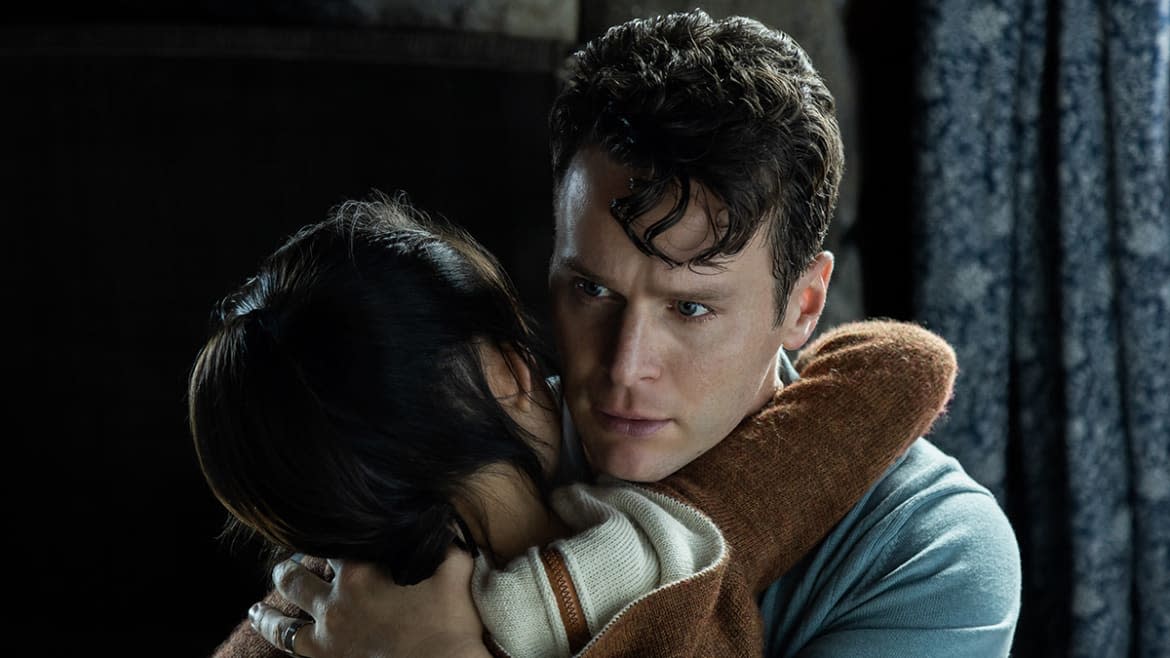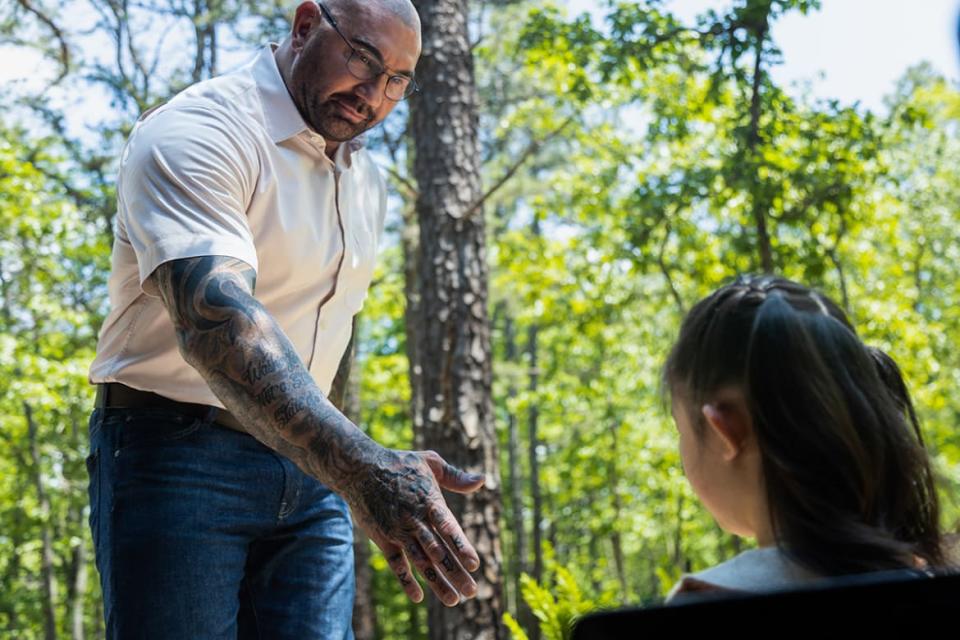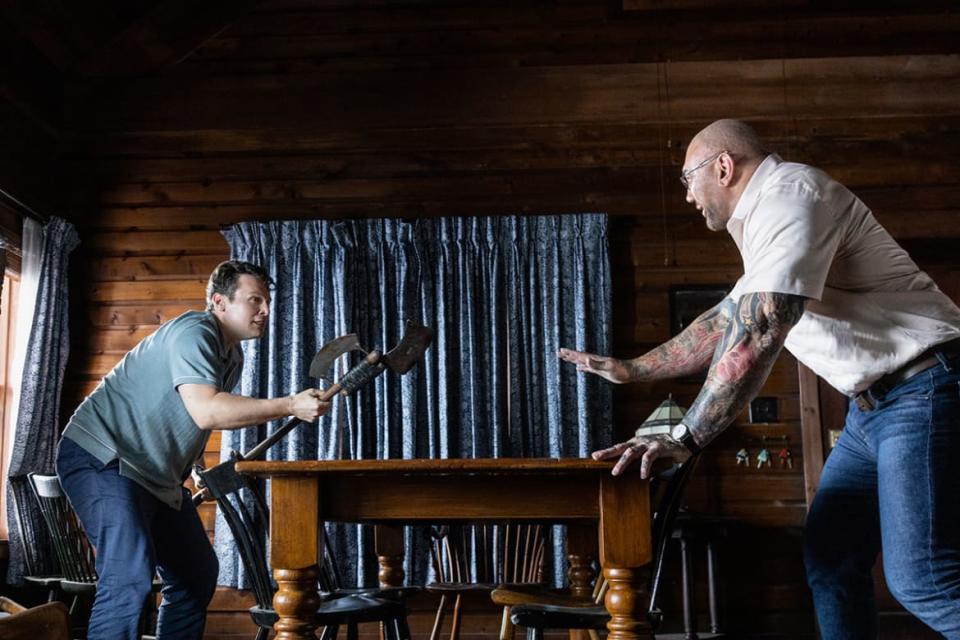‘Knock at the Cabin’ Could Have Had an Even More Shocking Ending

- Oops!Something went wrong.Please try again later.
- Oops!Something went wrong.Please try again later.
- Oops!Something went wrong.Please try again later.
Knock at the Cabin finds M. Night Shyamalan again choosing a project by plucking from his library of disturbing reads. This time, he adapted Paul Tremblay’s 2018 sci-fi horror novel The Cabin at the End of the World, a title only slightly less forgettable than that of the movie. And much like Old before it, Shyamalan’s take on the source material is a heavy deviation.
But considering how the novel ends in comparison to the film, Shyamalan should get Tremblay to start visiting his therapist ASAP. Because goddamn is that novel depressing—even more so than Knock at the Cabin, which at least suggests something of a happy ending.
(Warning: Spoilers for Knock at the Cabin and The Cabin at the End of the World below!)
‘Knock at the Cabin’ Is M. Night Shyamalan’s Return to Anxious, Heartfelt Form
The original ending
The Cabin at the End of the World does the one thing that nothing should ever do: let a kid die.
A family finds their peaceful cabin getaway ruined when a group of four evangelists for an oncoming apocalypse show up at their door and quickly restrain them. The group claims that, somewhat inexplicably, the world will end unless one of the three family members allows themselves to be sacrificed. The longer it takes for the family to choose who’s gotta go—and the clock is already ticking down—the worse the apocalypse will get.
While Knock at the Cabin ensures that Wen (Kristen Cui) sees it through to the end, alongside Daddy Andrew (Ben Aldridge), Tremblay’s novel disposes of the eight-year-old before the story ends.
After Andrew manages to break away from the chair his captors have tied him up to, he heads out to grab his gun from the car. Andrew and Leonard (played by Dave Bautista in the film) wrestle for control of the weapon; it goes off, and Wen is killed in the crossfire.

Cool! I totally want to keep reading after this! Thankfully (???), Tremblay keeps on going after deciding to pick off an elementary schooler for dramatic effect. Instead of Wen’s death ending the apocalypse, however, Andrew and husband Eric (Jonathan Groff in the movie) still have to choose which one of them will be sacrificed. Since Wen’s death was an accident, it doesn’t count.
From there, Eric and Andrew continue fighting back against the cultists who believe in the apocalypse—as well as their belief that this apocalypse is real. After they escape and outlive Leonard and his crew, Eric briefly suggests to Andrew that he be sacrificed for the good of humanity. Andrew refuses, as he refuses to cave into the will of some higher power who would let Wen die. That higher power’s name is Paul Tremblay, who then ends his book with both men alive, leaving whether the apocalypse was real or not up in the air.
Why Shyamalan’s ending is better
There are myriad issues with The Cabin at the End of the World’s ending, from an outside perspective. The ambiguity is a cop-out, a refusal to commit to the stakes that the story sets forth: Is humanity at stake or not? To introduce a story beat as ruthlessly provocative as having a parent accidentally killing their child requires a payoff—how will you regain the reader’s trust after this? How do you make such a death necessary to the plot, if not totally satisfying?
How ‘Infinity Pool’ Director Brandon Cronenberg Made His Hedonistic, NSFW Mindf*ck
The answer is, to me, by doing the opposite of what Tremblay chose to do: by answering the question put forth by your premise. Either make the apocalypse real or don’t. Make Andrew and Eric’s decisions meaningful in some way, whether it’s that their refusal to play along selfishly ends in the extinction of humankind or is validated, once the apocalypse is disproven.
Shyamalan, king of the striking finale—whether aggravating, unexpected, or both—understandably chose to go against Tremblay’s ending. Knock at the Cabin is much more satisfying for it, even if it’s decidedly less twisty than what we’ve come to expect from the director. The film makes a call: Eric will die, so that humanity can be saved. Andrew will raise Wen to overcome the trauma of losing Daddy Eric, who asked Daddy Andrew to shoot him. Eric says he can already see a much better world in his mind, one where Andrew and Wen (and the rest of Earth) find happiness again after staving off utter destruction.
Would it have been more narratively interesting if the apocalypse weren’t real? Or if Eric and Andrew held firm and watched the world implode, Wen in tow? Perhaps! But Knock at the Cabin suggests that Shyamalan is a humanist, first and foremost; the supernatural or divine forces that his characters contend with must be overcome. And even if they aren’t dispensed of—after all, we learn that the apocalypse is real, so there is some entity out there that has judged humanity as not particularly worth saving!—we, the viewer, must root for the good of human beings all the same. It is our inclination as people, and Shyamalan plays to our innate goodness with this film.

Shyamalan’s endings—or films!—can be over-complicated messes of poor storytelling, but there’s something tender about how he routinely emphasizes the power of human will above all. And sometimes, choosing the tough choice for the greater good is the best example of said willpower.
Andrew reckons with how cruel the world has been to him and Eric, as a gay married couple with an adopted daughter. Of course he would resist indulging this world by killing his loved one to save it. But he and Eric both can’t prioritize their past traumas over their belief in their daughter’s chance for a better future. For Eric and Andrew to make such a difficult call is not only the best choice, but also the right one: They believe the children are the future. End the apocalypse and let them lead the way.
Keep obsessing! Sign up for the Daily Beast’s Obsessed newsletter and follow us on Facebook, Twitter, Instagram and TikTok.
Get the Daily Beast's biggest scoops and scandals delivered right to your inbox. Sign up now.
Stay informed and gain unlimited access to the Daily Beast's unmatched reporting. Subscribe now.

